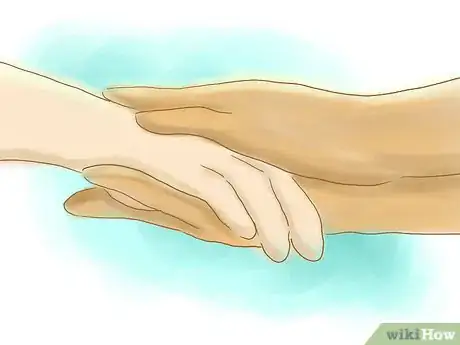This article was co-authored by Mary Church, PhD. Dr. Mary Church is a Licensed Clinical Psychologist based in Honolulu, Hawaii. With over a decade of clinical experience, she aims to integrate evolution, genetics, and neuroscience within the practice of psychotherapy. Dr. Church holds a BS in Psychology from Eckerd College and an MS and PhD in Experimental Psychology from The University of Memphis. She completed a Post-Doctorate in Clinical Psychology at The University of Hawaii at Manoa. In addition, Dr. Church is a member of the American Evaluation Association and Hawaii-Pacific Evaluation Association.
There are 8 references cited in this article, which can be found at the bottom of the page.
This article has been viewed 45,843 times.
You get that sinking feeling in your stomach any time you realize that your actions have negatively affected someone else. In order to right a wrong, you must be willing to deal with the consequences, apologize and move on. These steps can be as true with a clerical error at work as with a personal injury. Learning to deal with mistakes is one of the most meaningful opportunities for personal growth.
Steps
Acknowledging a Wrong
-
1
-
2Think about the immediate and long-term consequences of your actions. Many kids get the instruction, “Think about what you’ve done.” Adults must also take time to see whom they affected, and in some cases it may be multiple people.Advertisement
-
3Consider timing. If there are future consequences associated with a wrong, then you should try to repair the damage before it gets out of hand. On the other hand, waiting a little while to talk to the person may be the correct thing to do in cases where confrontation may hurt them and cooler heads would prevail.
-
4Think about the reasons you acted as you did and what made you behave in that manner. This is not a hunt for excuses, but rather a way to help you avoid similar behavior in the future.[3]
Taking Responsibility
-
1Don’t blame others. It is natural to place the blame on others. However, taking full responsibility may actually be the cleanest and easiest way to right the wrong.
-
2Avoid being defensive or making excuses. Similar to blame, excuses for a wrong can make the victim feel like you are trying to shy away from an apology.
- Don't try to hold onto your anger, either. Over time, anger can turn into hatred—that's why it's important to nip these feelings in the bud and resolve them.[4]
-
3Apologize for your actions in a straightforward and honest way. Explain to the person that you recognize that it was wrong, and that you are sorry for your behavior.[5] [6]
- Make your apology even more impactful by practicing empathy. Try to be clear about your own perspective while acknowledging the impact that your actions had on the other person.[7]
-
4Allow the person to ask you questions. Give them the opportunity to ask why or say something about being hurt. Try to avoid defensiveness, even if their response is emotional.
- Remember that although you may have been preparing an apology, they may not have been preparing a response. Reacting in an emotional way to a wrong is very normal. [8]
-
5Don’t ask for forgiveness. Just as an apology is yours to give, forgiveness is theirs to control. It should come when and if they are ready to forgive.
-
6Repeat with other wronged parties if necessary. You should aim to apologize to everyone who was directly or possibly even indirectly affected.[9]
Learning From Mistakes
-
1Take some time to think about the interaction. Allow yourself to feel guilt or sadness. The confrontation is likely to also be difficult for you.
-
2Think about what you’ve learned from the experience. Make any behavioral changes that you can to avoid the situation in the future.[10]
-
3Talk with someone about the process you went through. It may be an emotional time for you. Speaking to a friend or counselor can be helpful.
-
4Move on. Once you have completed these steps, take what you learned and understand that you will be able to approach future situations with more maturity and experience.
-
5Avoid feeling guilt after you have made these amends. Worrying about things that are out of your control is likely to hurt only yourself, after the wronged parties have moved on. Repeat the motto “Nobody is perfect.”[11]
Expert Q&A
-
QuestionWhat is the best way to resolve conflict?
 Mary Church, PhDDr. Mary Church is a Licensed Clinical Psychologist based in Honolulu, Hawaii. With over a decade of clinical experience, she aims to integrate evolution, genetics, and neuroscience within the practice of psychotherapy. Dr. Church holds a BS in Psychology from Eckerd College and an MS and PhD in Experimental Psychology from The University of Memphis. She completed a Post-Doctorate in Clinical Psychology at The University of Hawaii at Manoa. In addition, Dr. Church is a member of the American Evaluation Association and Hawaii-Pacific Evaluation Association.
Mary Church, PhDDr. Mary Church is a Licensed Clinical Psychologist based in Honolulu, Hawaii. With over a decade of clinical experience, she aims to integrate evolution, genetics, and neuroscience within the practice of psychotherapy. Dr. Church holds a BS in Psychology from Eckerd College and an MS and PhD in Experimental Psychology from The University of Memphis. She completed a Post-Doctorate in Clinical Psychology at The University of Hawaii at Manoa. In addition, Dr. Church is a member of the American Evaluation Association and Hawaii-Pacific Evaluation Association.
Research & Clinical Psychologist Honesty and empathy are the best way to go. Acknowledge the hurt that you caused, but also take time to explain why things happened the way that they did. Communicating your mistakes clearly and asking for forgiveness is a great way to resolve conflict.
Honesty and empathy are the best way to go. Acknowledge the hurt that you caused, but also take time to explain why things happened the way that they did. Communicating your mistakes clearly and asking for forgiveness is a great way to resolve conflict. -
QuestionWhy are apologies important?
 Mary Church, PhDDr. Mary Church is a Licensed Clinical Psychologist based in Honolulu, Hawaii. With over a decade of clinical experience, she aims to integrate evolution, genetics, and neuroscience within the practice of psychotherapy. Dr. Church holds a BS in Psychology from Eckerd College and an MS and PhD in Experimental Psychology from The University of Memphis. She completed a Post-Doctorate in Clinical Psychology at The University of Hawaii at Manoa. In addition, Dr. Church is a member of the American Evaluation Association and Hawaii-Pacific Evaluation Association.
Mary Church, PhDDr. Mary Church is a Licensed Clinical Psychologist based in Honolulu, Hawaii. With over a decade of clinical experience, she aims to integrate evolution, genetics, and neuroscience within the practice of psychotherapy. Dr. Church holds a BS in Psychology from Eckerd College and an MS and PhD in Experimental Psychology from The University of Memphis. She completed a Post-Doctorate in Clinical Psychology at The University of Hawaii at Manoa. In addition, Dr. Church is a member of the American Evaluation Association and Hawaii-Pacific Evaluation Association.
Research & Clinical Psychologist Apologies help address the anger that another person is feeling. Over time, anger transforms into hatred; in fact, hatred is just chronic anger. Nipping those negative feelings in the bud is an important way to prevent those feelings from building.
Apologies help address the anger that another person is feeling. Over time, anger transforms into hatred; in fact, hatred is just chronic anger. Nipping those negative feelings in the bud is an important way to prevent those feelings from building.
References
- ↑ https://www.psychologytoday.com/us/blog/fulfillment-any-age/201703/the-mindset-makes-it-hard-admit-youre-wrong
- ↑ Mary Church, PhD. Research & Clinical Psychologist. Expert Interview. 6 August 2021.
- ↑ https://www.wisebread.com/change-your-life-by-learning-how-to-admit-youre-wrong
- ↑ Mary Church, PhD. Research & Clinical Psychologist. Expert Interview. 6 August 2021.
- ↑ https://www.psychologytoday.com/us/blog/happiness-in-world/201012/how-admit-youre-wrong
- ↑ Mary Church, PhD. Research & Clinical Psychologist. Expert Interview. 6 August 2021.
- ↑ Mary Church, PhD. Research & Clinical Psychologist. Expert Interview. 6 August 2021.
- ↑ https://kidshealth.org/en/kids/sorry.html?WT.ac=ctg#cattake-care
- ↑ https://kidshealth.org/en/teens/apologies.html?WT.ac=ctg#cattake-care





































































